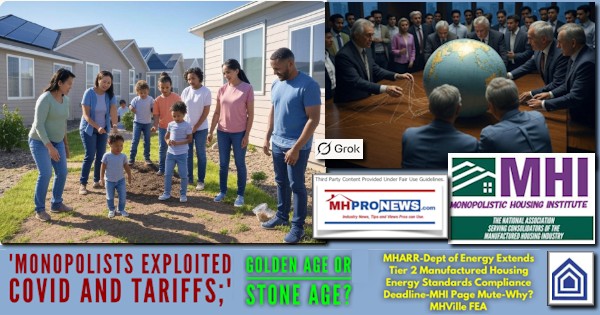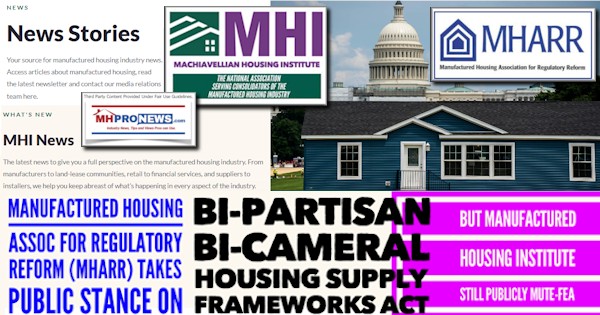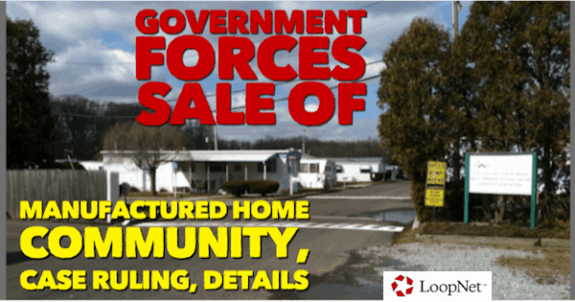
It was a case battled by the community owner’s attorney, who was joined by that state’s manufactured home association in an amicus brief. But a state appeals court ruling settled a legal battle in favor of a municipality’s right to take that land-lease community under eminent domain power, in order to meet their affordable housing needs.
Law and the NJ Law Journal reported that, “The eminent domain case, Robbinsville v. Mercer Mobile Home Park, flows from earlier litigation before a special master in which the township sought to establish compliance with low- and moderate-income housing requirements set forth in the Mount Laurel line of cases.”
Loopnet describes the property as follows, with the typos and spacing errors in the original: “The subject property is a 144 unit mobile home park located along Route 130 in Robbinsville Township, NJ. The park will accommodate five (5) addditional pad sites. The property is also improved with an on-site management office and maintenance building. The project includes 139 single-wide and 5 double- wide sites. The site is legally identified as proposed Block 1, Lot 59.01 containing 14.1 Acres. The property is located within an MH- Mobile Park Zone and represents a conforming use. All utilities are avaialble to the property. Subdivision of the park from a larger tract is approved and the filed map is pending. Stable NOI with annual CPI increases. Revised Rent Control Ordinance is pending.”
In a document obtained by MHProNews from the New Jersey Manufactured Housing Association (NJMHA), they stated last fall their stance on taking part in the matter. Punctuation, spacing, and other errors are in the original.
Attorney “Chris Hanlon has filed a brief at NJMHA’s request as “friend of the court” (amicus curiae) in that matter bearing the caption “Township of Robbinsville v. Mercer MHC LLC”. In that case, the Township of Robbinsville has filed a complaint seeking the right to condemn the Mercer Mobile Home Park for purposes of using a portion of its sites to satisfy its constitutional obligation to provide for low and moderate income housing. The owners of the mobile home park have challenged the legal right of the municipality to condemn a mobile home park for this purpose. The trial judge rejected this defense but the Appellate Division has granted the community owner the right to pursue an interlocutory appeal. The Association is going to seek the opportunity to participate in this appeal to support the argument of the community owner against the municipality’s right to use its Taking power for this purpose,” per the NJMHA.
The NHMHA cited these excerpts from the brief…
- “NJMHA is advocating for the restricted use of Eminent Domain to address a municipality’s Mt. Laurel housing obligation… This case presents a question of the extent to which the Courts should be deferential in evaluating a municipality’s alleged “commitment” to provide increased affordable housing, after decades of failing to do so, by condemning an existing affordable housing property operation for the express purpose of avoiding having to provide any additional new affordable housing opportunities within its borders.”
- If…“the municipality, or some other public agency, attempts to place restrictions on the tenants’ resale rights; that affects their property interests. No action has been commenced to attempt to do that. No forum has been provided to them, so they can advocate against restriction of their free market right to re-sell their homes in a rent controlled community.”
- “The trial judge committed reversible error in concluding that the acquisition of the Mercer Mobile Home Park and the imposition of deed restrictions would “create” affordable housing; its analysis is not based on a thorough record as required by law.”
- NJMHA in their pull quotes noted that the conclusion of the amicus brief stated, “the trial judge should have taken the time to conduct a full evidentiary hearing to create a welldeveloped record and not have used such a deferential standard related to the municipalities’ justification for the use of eminent domain in this case. This court should reverse the Trial Court.”
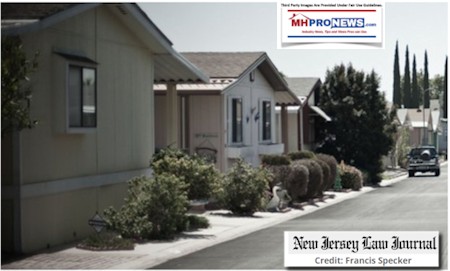
What Law Said…
David Gialanella writing for Law and the NJ Law Journal, said as follows. “According to the decision, the township’s 2015 case went to a special master and ultimately yielded a settlement that required in part that the township seek to acquire Mercer Mobile Home Park from its owner, Mercer LLC, for the purpose of adding 70 units of affordable housing.”
The bullets that follow are quotes from Gialanella narrative.
- Mercer was at first unresponsive to the township’s effort to engage in purchase negotiations, the court said. The township obtained an appraisal—setting the property value at about $5.7 million: $7.37 million, minus $1.51 million in needed sewer upgrades—and passed an ordinance approving the purchase. The township then made a written offer to Mercer for three lots. The lots were made up of the mobile home park itself, and two adjacent properties.
- Negotiations failed, and the township ended up changing its offer: $5.7 million for only the mobile home park, not the adjacent properties. Mercer came back with a counteroffer, but it lacked an appraisal, according to the decision.
- In the affordable housing case, an amendment to the settlement—contemplating Robbinsville’s use of condemnation proceedings to secure the park—was approved. The township filed a condemnation case, and in May 2018, Jacobson denied Mercer’s motion to dismiss, finding that the township had engaged in bona fide negotiations, as required by the state Eminent Domain Act, before going to court.
The court ruling itself is linked here as download. In it, are these pull quotes.
“In addition, municipalities are authorized under the powers of eminent domain to rehabilitate or convert existing structures for use as affordable housing. The FHA states:
[A] municipality may purchase, lease or acquire by gift or through the exercise of eminent domain, real property and any estate or interest therein, which the municipal governing body determines necessary or useful for the construction or rehabilitation of low and moderate income housing or conversion to low and moderate income housing.”
The FHA defines conversion as “the conversion of existing . . . residential structures for low and moderate income housing purposes where a substantial percentage of the housing units are provided for a reasonable income range of low and moderate income households.” N.J.S.A. 52:27D-304(g).
Industry professionals with investments in the community sector have noted a variety of ways that municipalities and other jurisdictions have been taking on manufactured home community owner’s property rights. For examples of some of those, see the related reports, linked below.
See the related reports, further below the byline, offers, and notices. That’s this morning’s manufactured home “Industry News, Tips, and Views Pros Can Use,” © where “We Provide, You Decide.” © ## (News, analysis, and commentary.)

Your link to industry praise for our coverage, is found here.
For the examples of our kudos linked above…plus well over 1,000 positive, public comments, we say – “Thank You for your vote of confidence.”
“We Provide, You Decide.” © ## (News, analysis and commentary.)
(Image credits and information are as shown above, and when provided by third parties, are shared under fair use guidelines.)
Submitted by Soheyla Kovach to the Daily Business News for MHProNews.com.

2) To pro-vide a News Tips and/or Commentary, click the link to the left. Please note if comments are on-or-off the record, thank you.
3) Marketing, Web, Video, Consulting, Recruiting and Training Re-sources

Related Reports:
You can click on the image/text boxes to learn more about that topic.
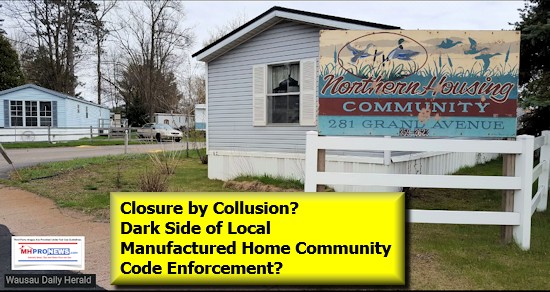
City and Residents locked in emotional tussle over MH Community closure






